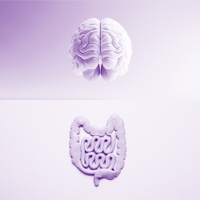
According to the results of a new study published in the journal Scientific Reports, prebiotic supplements can improve mental well-being, reduce symptoms of anxiety, and promote better gut health in young women (1).
Previous research suggests that modifying microbial diversity through the intake of certain probiotics and their nutrient sources (prebiotics) can alter microbial diversity toward a beneficial state, which can affect the gut-brain axis (2,3). Some clinical trials have linked pre- or probiotic intake to reduced depression or anxiety and decreased stress response (4,5,6).
The double-blind, placebo-controlled trial included 64 healthy females aged 18-25 years with sub-clinical anxiety, with no current or previous clinical diagnoses of anxiety. Participants received either a daily dose of the prebiotic galacto-oligosaccharides (GOS) (7.5g/d) or a placebo for 28 days.
The study focused specifically on this age group, as late adolescence/ early adulthood is a critical developmental stage for the emergence of social anxiety and emotional control, including fear response and anxiety (7). Furthermore, gut dysbiosis in adolescence has been shown to have lasting effects on mental health (8). Therefore, nutritional supplementation during this developmental period has the potential to offset mental health-related illnesses in later adulthood.
All participants completed self-report and psychological self-assessment questionnaires on mood, emotion regulation, anxiety and sleep and provided stool samples at baseline and follow-up for gut microbiome sequencing analysis. Volunteers also undertook attention dot-probe tasks to assess emotional responses when exposed to negative, positive, and neutral word pairs.
Based on trait anxiety scores, volunteers in each group were stratified into high anxious and low anxious groups to consider the effects and interactions of GOS and general anxiety levels.
Forty-eight participants completed the study, of whom 23 received GOS (high anxiety n=12; low anxiety n=11) and 25 received placebo (high anxiety n=13; low anxiety n=12).
Compared to placebo, GOS supplementation in high anxious participants reduced self-reported trait anxiety scores. High anxious participants also had reduced attention (bias) to negative stimuli and greater bias to positive stimuli in the dot-probe task.
Gut microbiota composition was characterised by increased Bifidobacterium abundances at follow-up in the GOS group compared to placebo. Furthermore, multivariate analysis indicated that gut microbiota genera influenced psychological measures across time in high anxious participants. Together, these findings suggest that GOS supplementation has an anxiolytic effect in high anxious late adolescent females, mediated by change in gut microbiota composition towards more beneficial Bifidobacterium.
However, GOS supplementation did not affect measures of mood, depression, emotion regulation or social or state anxiety.
Prebiotics, such as GOS, are an emerging therapy for mood disorders. Experimental studies have demonstrated anxiolytic, antidepressant and stress-reducing effects of GOS (9,10). In a 12-week clinical trial, 7 g/day GOS enhanced Bifidobacterium species and reduced anxiety symptoms in patients with irritable bowel syndrome (11). In adults, GOS supplementation (5.5 g/day) over 3 weeks had anxiolytic-like effects and decreased waking salivary cortisol concentrations and attentional vigilance to negative stimuli (12).
The small sample size and inclusion of only females with sub-clinical anxiety limits the broader clinical application of the data collected in the study. However, the positive findings add to the growing body of evidence that indicates manipulating the microbiota-gut-brain axis through pre- and probiotic supplementation can benefit mental health and well-being. Further studies are warranted to assess the benefits of prebiotics in both clinical and sub-clinical populations.






